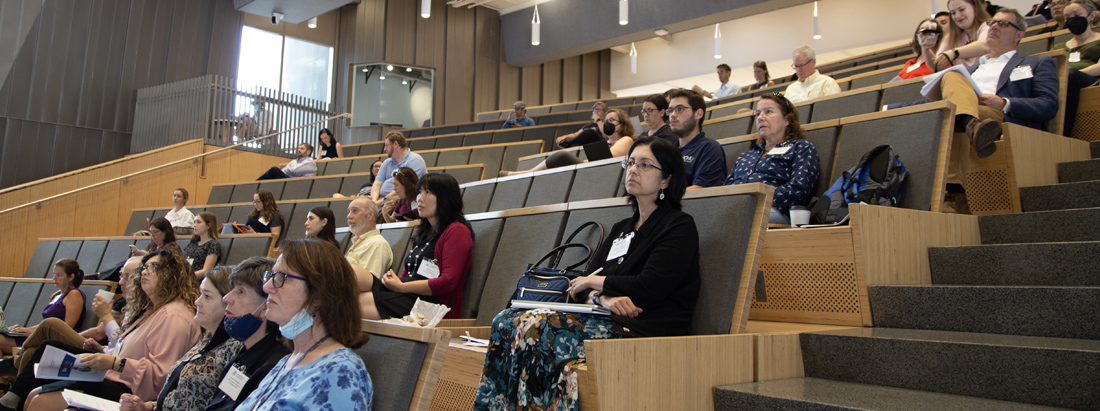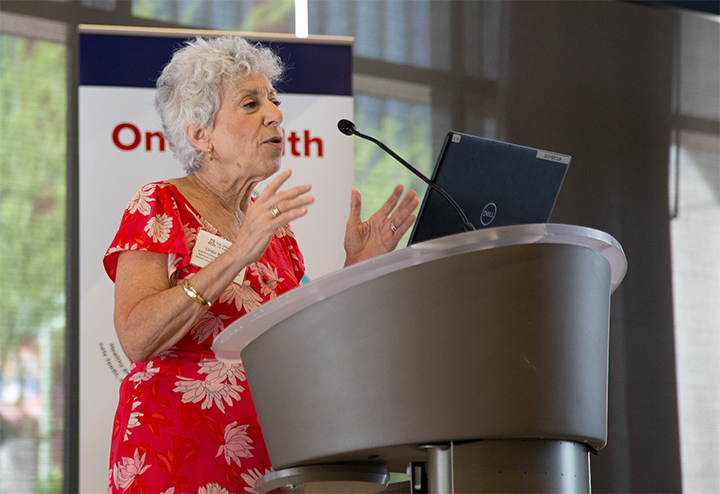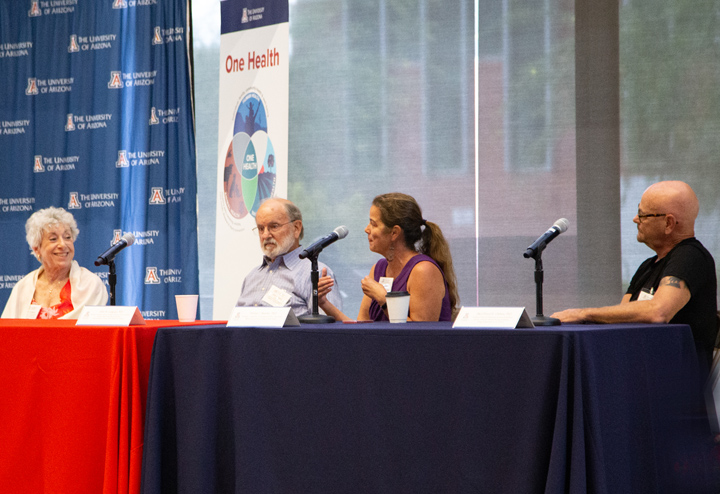One Health Symposium Brings National Leader in Toxicology Research

The emerging field of One Health builds from the knowledge that human health is deeply interconnected with environmental health and animal health. Organized by UArizona Health Sciences, the second One Health Symposium featured Dr. Linda S. Birnbaum, a national leader in toxicology research, as the keynote speaker.
The University of Arizona Health Sciences, in close collaboration with the Zuckerman College of Public Health, hosted its second One Health Symposium on September 28, 2022, to bring together One Health researchers from across the University of Arizona and build connections for collaboration. Linda S. Birnbaum, PhD, DABT, ATS, scientist emeritus and former director of the National Institute of Environmental Health Sciences and the National Toxicology Program, gave the keynote address and shared her perspectives on the One Health approach to pollution.
The One Health approach understands that human health is deeply interconnected with environmental health and animal health. The health of all living things is woven together as one. One Health research uses an interdisciplinary and often community-based approach to solve complex health problems that emerge from environmental contamination, animal-to-human disease transmission, the impacts of climate change, and many other pressing issues.
This recent One Health Symposium brought together more than a dozen UArizona researchers who presented on their projects and programs that use a one health approach to analyze and solve complex health problems. Frank von Hippel, PhD, from the Zuckerman College of Public Health organized the event in collaboration with Randi Willmeng from the office of Dr. Michael Dake, MD, senior vice president for University of Arizona Health Sciences. Dr. Iman Hakim, dean of the Zuckerman College of Public Health, gave the closing remarks.
Many federal funding agencies including the National Institutes of Health (NIH), the U.S. Department of Agriculture (USDA), the National Science Foundation (NSF), and the Centers for Disease Control (CDC) have come to prioritize One Health research as a vital field to meet emerging health challenges for humans and the environment. The Symposium brought together researchers from across the university and beyond, including the College of Agriculture and Life Sciences (CALS), the Arizona Institute for Resilient Environments and Societies (AIRES), the Valley Fever Center for Excellence, the U.S. Department of Veteran’s Affairs, and the Zuckerman College of Public Health (COPH), give presentations and make connections for future One Health research.

Linda Birnbaum, PhD, DABT, ATS, a national leader in toxicology and environmental pollution gave the keynote presentation.

The panel discussion on research collaboration included, from left-to-right: Linda Birnbaum, PhD, DABT, ATS, Paloma Beamer, PhD, John Galgiani, MD, and Floyd (Ski) Chilton, PhD.
Fall 2022 One Health Symposium Program
Opening Remarks
No Video Available
Frank von Hippel, PhD,
Professor, Environmental Health Sciences
Department of Community, Environment and Policy
Mel & Enid Zuckerman College of Public Health
Keynote Address: A One Health Approach to Pollution
Linda S. Birnbaum, PhD, DABT, ATS,
Scientist Emeritus and Former Director,
National Institute of Environmental Health Sciences and National Toxicology Program
Scholar in Residence, Nicholas School of the Environment,
Duke University

Research Presentations
At the Symposium several researchers, many of them from the College of Public Health, gave presentations on their One Health research projects.
Session 1 Research Partnerships with Indigenous Communities
Indigenous Science and One Health: Possibilities for Meaningful Collaboration
Kelsey Dayle John, PhD (Diné)
Assistant Professor, Gender and Women's Studies & American Indian Studies
College of Social and Behavioral Sciences
and
Daniel Sestiaga Jr., MPH (Ft. Yuma Quechan)
Program Manager, AIRES/Haury IRC
Arizona Institute for Resilient Environments & Societies (AIRES)
Community Driven University Partnerships to Assess Exposures and Risk Perceptions of Diné Communities Following the Gold King Mine Spill
Paloma I. Beamer, PhD
Professor, Community, Environment & Policy Department
Mel & Enid Zuckerman College of Public Health
Rocky Mountain Spotted Fever in Arizona: Collaborative Research and Community Action
Kathleen R. Walker, PhD
Associate Specialist and Associate Professor, Entomology
College of Agriculture & Life Sciences, Nutritional Sciences
Measuring Wellbeing of the Communities in Coupled Human-Natural Systems: A Study from the Sundarbans Mangrove Ecosystem, Bangladesh
Abu SMG Kibria, PhD
Postdoctoral Research Associate
School of Natural Resources and the Environment
College of Agriculture & Life Sciences, Nutritional Sciences
Arizona Institute for Resilient Environments and Societies (AIRES)
Session 2 Nutrition & Disease
Personalized Nutrition and Wellness: Transforming Sick-Care to Well-Care
(Ski) Floyd H. Chilton, PhD
Professor, School of Nutritional Sciences and Wellness
Director, Center for Precision Nutrition and Wellness
College of Agriculture & Life Sciences
Linking Soil Health to Human Nutrition
Joseph Blankinship, PhD
Assistant Professor, Soil Ecology and Soil Health
Department of Environmental Science
College of Agriculture and Life Sciences
A One Health-Relevant Intervention for Clostridioides Difficile Infection
Gayatri Vedantam, PhD
Professor and Associate Director (Research)
School of Animal & Comparative Biomedical Sciences
Co-Director, Collaboratory for Anti-Infective & Therapeutic Strategies
Research Career Scientist, US Dept. of Veterans Affairs
How to Starve a Malaria Parasite by Manipulating Pantothenate Levels in the Mosquito
Michael Riehle, PhD
Professor, Entomology
College of Agriculture & Life Sciences
Session 3 Zoonoses
Wastewater-Based Epidemiology: A Case Study in a Fruit Processing Plant and the Case for One Health Implementation
Paul Brierley
Executive Director
Yuma Center of Excellence for Desert Agriculture
College of Agriculture & Life Sciences, Nutritional Sciences Cooperative Extension
and
Stephanie Slinski, PhD
Associate Director for Applied Research & Development
Yuma Center of Excellence for Desert Agriculture
College of Agriculture & Life Sciences, Nutritional Sciences Cooperative Extension
Social and Ecological Determinants of Zoonotic and Vectorborne Disease Transmission in the Desert Southwest and Globally
Kacey C. Ernst, MPH, PhD
Professor and Program Director of Epidemiology
Department of Epidemiology and Biostatistics
Mel & Enid Zuckerman College of Public Health
Wildlife Monitoring to Detect Emerging Viral Diseases in Urban and Wild Populations
Melanie Culver, PhD
Assistant Leader, AZ Cooperative Fish and Wildlife Research Unit, USGS
Assistant Professor, Wildlife Conservation and Management Program
School of Natural Resources and the Environment
College of Agriculture and Life Sciences
A Valley Fever Vaccine, Discovered and Developed Across Three Kingdoms
John N. Galgiani, MD
Professor, University of Arizona Colleges of Medicine – Tucson and Phoenix
Director, Valley Fever Center for Excellence
Director, Banner University Health Valley Fever Program

Panel Discussion Promoting One Health Collaborations at the University of Arizona
Watch Panel Discussion on YouTube >
Following the individual presentations, a panel discussion with research leaders from across the university shared their perspectives the UArizona’s strong foundation in One Health research, and the opportunities for collaboration and funding in the future.
One Health Symposium Panelists
Paloma I. Beamer, PhD
Professor, Community, Environment & Policy Department, COPH
Linda S. Birnbaum, PhD, DABT, ATS
Scientist Emeritus and Former Director, National Institute of Environmental Health Sciences and National Toxicology Program
Scholar in Residence, Nicholas School of the Environment, Duke University
(Ski) Floyd H. Chilton, PhD
Professor, School of Nutritional Sciences and Wellness, Director, Center for Precision Nutrition and Wellness, CALS
John N. Galgiani, MD
Professor, University of Arizona Colleges of Medicine – Tucson and Phoenix
Director, Valley Fever Center for Excellence br /> Director, Banner University Health Valley Fever Program
Kate Worthing, BVSc, PhD
Assistant Professor of Practice, CVM

Closing Remarks for the One Health Symposium
Iman Hakim, MD, PhD, MPH
Dean, Mel & Enid Zuckerman College of Public Health

